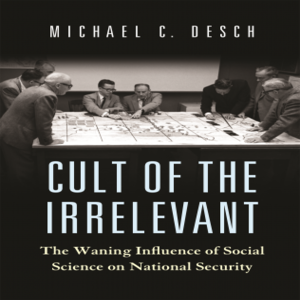Are Academic Social Scientists in Thrall of a Cult of the Irrelevant and Will This Make Them Hors de Combat in National Security Affairs?


“Are Academic Social Scientists in Thrall of a Cult of the Irrelevant and Will This Make Them Hors de Combat in National Security Affairs?“
Speaker: Desch, M. (University of Notre Dame)
Date: 16 July 2019
Speaker Session Preview
SMA hosted a speaker session presented by Dr. Michael Desch (University of Notre Dame) as a part of its SMA General Speaker Series. Dr. Desch’s presentation focused on his book, entitled Are Academic Social Scientists in Thrall of a Cult of the Irrelevant and Will This Make Them Hors de Combat In National Security Affairs? To begin, Dr. Desch stated that those studying international relations and social sciences in general aspire to maintain a balance of both rigor and relevance, though there are tensions between the two. He explained that there is a propensity for social scientists to prioritize rigor over relevance (i.e., technique over substance). Those who fall victim to this propensity are in “the Cult of the Irrelevant.” Dr. Desch provided evidence supporting this cult’s existence by displaying two figures that examined the percentage of policy-relevant articles in the American Political Science Review (APSR) from 1906 to 2006 and indicated a decreasing willingness of scholars to offer policy recommendations as disciplines/fields became more “scientific.” Dr. Desch argued that the Cult of the Irrelevant persists largely as a result of disciplinary professionalization. He explained that, although having people become specialists in certain areas can be an engine of intellectual progress, it can also lead to the production of narrower work. Furthermore, basic research is being prioritized over applied work. In his book, Dr. Desch also looked at the subfield of national security studies from World War II through the creation of the Minerva Initiative, describing two key findings. Firstly, disciplinary dynamics tended towards disengagement with policy/applied research. Secondly, the international security environment in wartime and periods of high threat displayed a greater demand for academic expertise and a greater willingness to balance rigor and relevance, whereas in peacetime, the opposite was true. Dr. Desch then explained that there already is a great deal of attention being paid to application and belief in the “trickle-down thesis,” which states that research will eventually find a way to influence policy through a trickle-down process. However, Dr. Desch remains pessimistic because this trickle-down thesis is assumed rather than proven, and the social science pieces that have been influential in impacting policy have not been representative of the most scholarly instances. Moreover, they have come into political debates through other mechanisms. He then focused on the pros and cons of the Minerva Initiative’s foundation and work. To conclude, Dr. Desch discussed what needs to be done–namely, to strike a balance between rigor and relevance and to encourage social scientists to speak to broader policy debates.
Michael Desch Bio
Michael C. Desch is Packey J. Dee Professor of International Relations at the University of Notre Dame and founding Director of the Notre Dame International Security Center. He served two terms as chair of the Department of Political Science. He was also the founding Director of the Scowcroft Institute of International Affairs and the first holder of the Robert M. Gates Chair in Intelligence and National Security Decision-Making at the George Bush School of Government and Public Service at Texas A&M University from 2004 through 2008. From 1993 through 1998, he was Assistant Director and Senior Research Associate at the Olin Institute. He spent two years (1988-90) as a John M. Olin Post-doctoral Fellow in National Security at Harvard University's Olin Institute for Strategic Studies, among other positions. He received his B.A. (With honors) in Political Science (1982) from Marquette University and his A.M. in International Relations (1984) and Ph.D. in Political Science (1988) from the University of Chicago. He is the author of When the Third World Matters: Latin America and U.S. Grand Strategy(Baltimore: The Johns Hopkins University Press, 1993), Civilian Control of the Military: The Changing Security Environment(Baltimore: The Johns Hopkins University Press, 1999), Power and Military Effectiveness: The Fallacy of Democratic Triumphalism (Baltimore: Johns Hopkins University Press, 2008), and Cult of the Irrelevant: The Waning Influence of Social Science on National Security (Princeton, NJ: Princeton University Press, 2018); co-author of Privileged and Confidential: The Secret History of the President=s Intelligence Advisory Board (Lexington: University Press of Kentucky, 2012); co-editor of From Pirates to Drug Lords: The Post-Cold War Caribbean Security Environment (Albany: State University Press, 1998), and editor ofPublic Intellectuals in the Global Arena: Professors or Pundits? (Notre Dame, IN: University of Notre Dame Press, 2016) andSoldiers in Cities: Military Operations on Urban Terrain (Carlisle, PA: U.S. Army War College, 2001). He has published numerous scholarly and broader interest articles. He has worked on the staff of a U.S. Senator, in the Bureau of Intelligence and Research at the Department of State, and in the Foreign Affairs and National Defense Division of the Congressional Research Service.
